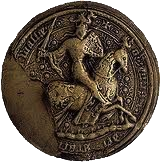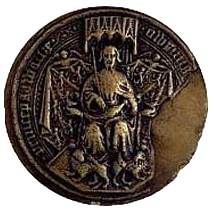Glyn Dŵr - the Statesman
Owain’s public image is that of the revolutionary warrior prince. The public are far less conscious of his formidable skills as statesman and diplomat.
France and England had been rivals and foes for centuries and in 1337 the Hundred Years War started. In his revolt against the repression of the English crown Owain sought support from France, who had established links with Scotland and Ireland.
Owain Lawgoch (Owain of the Red Hand), a great nephew of Llywelyn the Last, spent most of his life in exile in France as an officer in the French army. His dynastic claims made him a grave threat to the English throne especially when, in 1372, the French king gave him a fleet and an army to invade Wales. The expedition was called off. The English were very conscious of the threat posed by Owain and sent John Lamb (a Scot) to France in 1378 to assassinate him. Owain's French service may have been influential when Glyndŵr was to call for assistance from France later.
Henry IV was heavily involved in expensive campaigns in Scotland and Ireland, and his right to the English throne was questioned. In 1401 a Welsh knight, Dafydd ab Ifan Goch, was sent as an emissary to the king of Scotland on behalf of Glyndŵr. In 1403-4 the French squadron of Jean d’Espagne had worked with the Welsh and Owain sent his brother-in-law John Hanmer, and his chancellor Gruffudd Young to France. A treaty was concluded on July 14th 1404.
A French force left Brest on July 22nd, 1405 with 140 ships carrying 800 men-at-arms, 600 crossbowmen, and 1,200 lightly armed troops, and reached Milford Haven early in August. They joined Owain’s men on a march through south Wales, into England, and reached Woodbury Hill within 8 miles of Worcester. In November, however, a large body of French knights returned to France, and early in 1406 the rest of the French went home. Only feeble attempts were made afterwards to provide replacements for them and after this there were to be no more combined military operations to speak of.
On March 31st. 1406 Owain Glyndŵr sent a letter in Latin to king Charles VI of France at the synod of the Welsh Church at Pennal (known as the Pennal Letter). This is the most important document of Glyndŵr's period as it highlights Owain’s ambitions for Wales as an independent country, with its own universities and Church.







